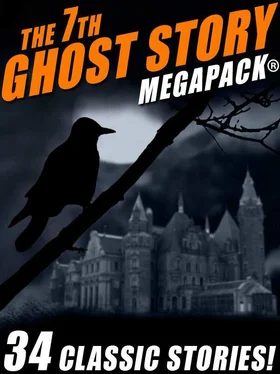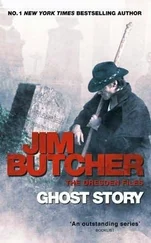Hoyt hoped against hope that the friends of the dead woman would somehow forget about the photographs, but of course the wish was unreasonable, and one day the daughter appeared and asked to see the photographs of her mother.
“Well, to tell the truth,” stammered Hoyt, “those didn’t come out as well as we could wish.”
“But let me see them,” persisted the lady. “I’d like to look at them, anyway.”
“Well, now,” said Hoyt, trying to be soothing, as he believed it was always best to be with women—to tell the truth, he was an ignoramus where women were concerned—“I think it would be better if you didn’t see them. There are reasons why—” he ambled on like this, stupid man that he was, and of course the Jewess said she would see those pictures without any further delay.
So poor Hoyt brought them out and placed them in her hand, and then ran for the water pitcher, and had to be at the bother of bathing her forehead to keep her from fainting.
For what the lady saw was this: Over face and flowers and the head of the coffin fell a thick veil, the edges of which touched the floor in some places. It covered the features so well that not a hint of them was visible.
“There was nothing over mother’s face,” cried the lady at length.
“Not a thing,” acquiesced Hoyt. “I know, because I had occasion to touch her face just before I took the picture. I put some of her hair back from her brow.”
“What does it mean, then?” asked the lady.
“You know better than I. There is no explanation in science. Perhaps there is some in psychology.”
“Well,” said the lady, stammering a little and coloring, “mother was a good woman, but she always wanted her own way, and she always had it, too.”
“Yes?”
“And she never would have her picture taken. She didn’t admire herself. She said no one should ever see a picture of hers.”
“So?” said Hoyt, meditatively. “Well, she’s kept her word, hasn’t she?”
The two stood looking at the pictures for a time. Then Hoyt pointed to the open blaze in the grate.
“Throw them in,” he commanded. “Don’t let your father see them—don’t keep them yourself. They wouldn’t be good things to keep.”
“That’s true enough,” said the lady, slowly. And she threw them in the fire. Then Virgil Hoyt brought out the plates and broke them before her eyes.
And that was the end of it—except that Hoyt sometimes tells the story to those who sit beside him when his pipe is lighted.
THE GHOST OF A LIVE MAN,
by Anonymous
Taken from Twenty-Five Ghost Stories (1904).
We were in the South Atlantic Ocean, in the latitude of the island of Fernando Norohna, about 40 degrees 12 minutes south, on board the barque H. G. Johnson, homeward bound from Australia. I was the only passenger, and we had safely rounded Cape Horn, with the barometer at 28 degrees 18 minutes, and yet had somehow miraculously escaped any extremely heavy gale—had had light northerly and easterly winds till we reached 20 degrees, and thence the southeast trades were sending us fast on our way to the equator. I sat on deck smoking my pipe, with a glorious full moon shedding its bright pathway across the blue waters, and chatting with the first mate, a man some fifty-eight years of age, who had followed the sea since he was a boy. For twenty years or more he had been mate or captain, and many and varied were the experiences he could relate. A thorough sailor and skillful navigator, he was as honest as the day is long—had a heart as big as an ox and was an all-round good fellow and genial companion. Some of his yarns might be taken cum grano salis, yet he always positively assured me that he “was telling me the truth.” An account of a voyage that he made in a whaler from the Southern Ocean to New Bedford seemed to me worthy to be repeated. He had rounded Cape Horn six times and the Cape of Good Hope twenty-six times, besides making many trips across the Western Ocean and to South American ports. I give his account as near as possible in his own words:
“It was in ’71 that I commanded the whaler Mary Jane. We had been out from home over three years, and had on board a full cargo of whale oil, besides 2,000 pounds of whalebone, which was then worth $5 per pound. I also had been fortunate enough to find in a dead whale which we came across a large quantity of ambergris, and our hearts were all very light as we began our homeward voyage, and our thoughts all tended to the hearty welcome which we should receive from wives and sweethearts when we reached our journey’s end. Many a night as I lay in my berth I had thought with great pleasure of the amount of money that would be coming to me from the proceeds of our voyage when we arrived in New Bedford.
“I calculated that I had made $12,000 as my share of the proceeds of the whalebone and oil—to say nothing of the ambergris, which I well knew would bring at least $20,000, and one-half of which belonged to me. You can therefore imagine that I was well pleased with myself as we went bounding along through the southeast trades. We crossed the equator in longitude 36 and soon after took strong northeast trades, and all was going as well as I could wish. We had put the ship in perfect order, painted her inside and out, and you would never have recognized her as the old whaling ship that had for three years been plying the Southern Ocean for whales. Never shall I forget an old bull whale that we tackled about two degrees to the south of Cape Horn—but that is another story, which I will give you another time.
“We had just lost the northeast trades and were entering the Gulf Stream. I sat in my cabin with my chart on the table before me rolled up. I had just picked our location on it, and was thinking that in a week more I should be at home, surrounded by those near and dear to me, and relating to them the story of my great good fortune.
“It was always my custom to work up my latitude and longitude about four o’clock in the afternoon, and then after supper pick off her position on the chart, have a smoke and perhaps just before retiring a nip of grog, and then at 8.30 o’clock, as regular as a clock, I would turn in.
“I am a great smoker, and this day I had been smoking all the afternoon, besides having had two or three nips. We had a dog on board whom we called ‘Bosun,’ who had been out with us all the voyage, and who was afraid of nothing. He had endeared himself to every man on board, and when Bosun ‘took water’ something very serious was in the wind. This night as I sat in the cabin I heard a most dismal howl from Bosun, and called out to the mate to know what was the matter with the dog. He replied that he ‘reckoned some of the men had been teasing him,’ and the occurrence soon passed from my mind.
“Suddenly I saw someone coming down the after companion way into the cabin. I supposed at first it was the mate and wondered that he had not first spoken to me, but then I noticed that he wore clothes I had never seen on the mate, and as he advanced into the cabin I saw his face. It was the face of a man I had never seen in my life. He was thin and pale and haggard, and as he advanced he looked about the cabin and at the rolled up chart on the table. There seemed to be an appeal in his eyes, and then there swept over his face a look of intense disappointment, and before I could move or speak, he had vanished from my sight.
“Now I am a very practical man, and I at once straightened myself in my chair and said to myself: ‘Well, old man, you have smoked one too many pipes today, or else you have had one drink too much, for you have been asleep in your chair and seen a ghost.’ I was quite satisfied that I had had a dream, especially as I called to the mate and asked him if he had seen anyone come below. He said no; that he had not left the deck for the last hour, and the man at the wheel, directly in front of the door, was sure no one had entered the cabin, so I convinced myself that I had had a very vivid dream—though I could not help thinking of the matter all through the next day.
Читать дальше












